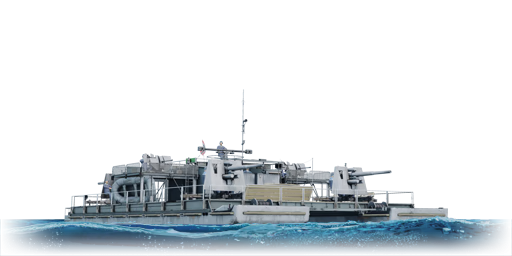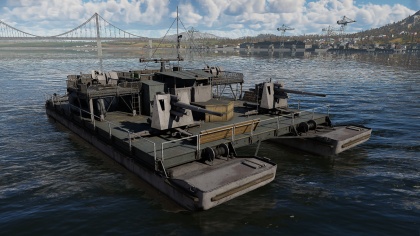Difference between revisions of "SF40 Heavy"
(→Primary armament) (Tag: Visual edit) |
m (→Secondary armament) (Tag: Visual edit) |
||
| Line 23: | Line 23: | ||
=== Secondary armament === | === Secondary armament === | ||
| − | * Two 20 mm | + | * Two 20 mm C/38 cannon (2000 rounds) |
== Usage in battles == | == Usage in battles == | ||
Revision as of 12:41, 28 August 2019
Contents
Description
The Siebelfähre 40 Heavy is a Rank III German anti-air ferry
with a battle rating of 2.7 (AB/RB/SB). It was introduced in Update 1.79 "Project X" in the fleet closed beta test.
General info
Survivability and armour
Talk about the vehicle’s armor. Note the most well-defended and most vulnerable zones, e.g. the ammo magazine. Evaluate the composition of components and assemblies responsible for movement and maneuverability. Evaluate the survivability of the primary and secondary armament separately. Don't forget to mention the size of the crew, which plays an important role in fleet mechanics. Tips for preserving survivability should be saved for the “Use in battle” section.
If necessary, use a graphics template to show the most well-protected or most vulnerable points in the armour.
Mobility
Write about the ship’s mobility. Evaluate its power and manoeuvrability, rudder rerouting speed, stopping speed at full tilt, with its maximum forward speed and reverse speed.
Armament
Primary armament
- Four 88 mm Flak 36 guns (100 rounds)
Secondary armament
- Two 20 mm C/38 cannon (2000 rounds)
Usage in battles
Describe the technique of using this ship, the characteristics of her use in a team and tips on strategy. Abstain from writing an entire guide – don’t try to provide a single point of view, but give the reader food for thought. Talk about the most dangerous opponents for this vehicle and provide recommendations on fighting them. If necessary, note the specifics of playing with this vehicle in various modes (AB, RB, SB).
Pros and cons
Pros:
- Powerful 88 mm guns can destroy a target with just 1 or 2 hits
- Can take quite a few hits
- Velocity and flat trajectory of shells makes it suitable to hang back and snipe enemies from +2 km
Cons:
- Not very fast or manoeuvrable
- Large target
- Lacks an AP shell for dealing with armoured targets.
- The 37 mm fast firing flak on the SF40 Leichte is replaced by two single 20 mm mounts
- Hard to get all 4 cannons on target
- Easy to torpedo or dive bomb due to its size and sluggishness
- Lacks a VT-fuze shell, only has timed and impact fuzes
History
The Siebelfähre was designed by Friedrich Siebel, owner of a lesser-known German aircraft manufacturing company bearing his name. Siebel’s idea was to provide the German army with a much needed easily mass-produced and effective transport vessel for the planned invasion of Britain.
His ferry would be a construction utilising parts of Bailey bridges and pontoons, which would make up the two barges connected in a catamaran style by a wooden deck. The vessel was supposed to be powered by aircraft engines and could easily be disassembled and reassembled thanks to its modular construction, allowing for the boat to also be transported by land.
The idea was met with great enthusiasm from the German military, and an order for 400 of this ferrycraft soon followed. The order encompassed more than just one version of the vessel, however. For instance, some versions were specialised to perform anti-air duties and were meant to cover the landing troops from air attacks. These were equipped with light 20mm and 37mm AA guns up to the heavy FlaK 88mm cannon, depending on the version.
However, before all 400 vessels could be made, the Invasion of Britain was cancelled, and thus the need for the Siebelfähre also disappeared below the waves. Nonetheless, around 200 of these vessels were still made before the order was cancelled and a majority of them found use in transport and mine-laying operations in the Black Sea and the Mediterranean. The Siebelfähre saw use right up to the end of the war, and some vessels continued serving well into the 1960s as civilian ferries.
- From Devblog
Media
An excellent addition to the article will be video guides, as well as screenshots from the game and photos.
See also
Links to the articles on the War Thunder Wiki that you think will be useful for the reader, for example:
- reference to the series of the ship;
- links to approximate analogues of other nations and research trees.
External links
| Germany barges | |
|---|---|
| Anti-air ferries | SF40 Light · SF40 Heavy |
| Naval ferry barges | AF D1 · AF D3 |





